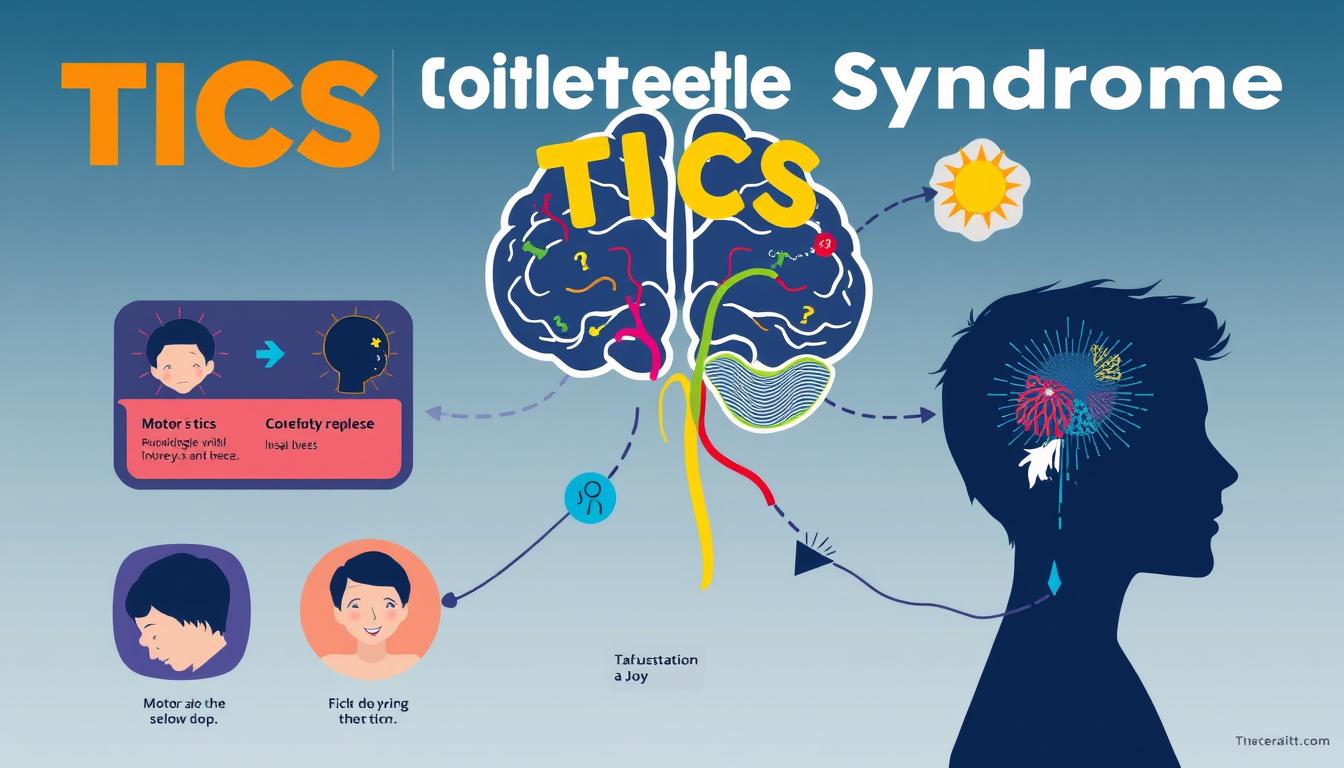Adolescence is a time of big changes, and it’s key to spot anxiety disorders early. These issues can really hurt a teen’s mental health. Knowing about Anxiety Disorders in Adolescents is the first step to helping them.
Adolescence brings many changes, like physical, emotional, and social shifts. It’s normal for teens to feel stressed or worried. But if these feelings don’t go away and start to mess with their daily life, it might be an anxiety disorder.
Key Takeaways
- Anxiety disorders are common among adolescents, affecting their mental health and well-being.
- Early recognition of the signs and symptoms of anxiety disorders is critical for timely support and intervention.
- Anxiety disorders can significantly impact a teen’s school performance, social life, and overall happiness.
- Knowing the different types of anxiety disorders and their risk factors helps parents, teachers, and doctors identify and tackle these issues.
- Getting professional help and using effective coping strategies are key to managing anxiety disorders in teens.
What Are Anxiety Disorders in Adolescents?
Anxiety disorders in teens are mental health issues that cause too much worry and fear. They can really affect a teenager’s life, impacting their feelings, social life, and school work.
Common Types of Anxiety Disorders
Among teens, the most common anxiety disorders are Generalized Anxiety Disorder, Social Anxiety, and Panic Attacks. Generalized Anxiety Disorder is about constant worries about many things. Social Anxiety makes people very scared or uncomfortable in social situations. Panic Attacks are sudden, intense episodes of fear and physical symptoms.
Risk Factors and Prevalence
Genetics, environment, and psychology can all play a part in anxiety disorders in teens. Life experiences like trauma can raise the risk. Studies show that up to 32% of teens in the U.S. have an anxiety disorder.
Impact on Daily Life
Anxiety disorders can really mess up a teen’s life. They can make it hard to hang out with friends, do well in school, and form healthy relationships. Teens with anxiety might feel physical symptoms like headaches or stomachaches. They might also feel irritable, have trouble focusing, and feel overwhelmed.
| Anxiety Disorder | Prevalence in Adolescents | Common Symptoms |
|---|---|---|
| Generalized Anxiety Disorder | 10-12% | Excessive worry, difficulty concentrating, restlessness |
| Social Anxiety | 7-13% | Fear of social situations, avoidance of social interactions, physical symptoms like blushing or trembling |
| Panic Attacks | 5-8% | Sudden onset of physical and emotional distress, including rapid heartbeat, shortness of breath, and feelings of impending doom |
It’s important to know about anxiety disorders in teens to help them. By spotting the signs early and getting help, we can support them through tough times. This helps them build a strong foundation for their mental health in the future.
Recognizing Early Warning Signs of Teen Anxiety
As parents, teachers, or caregivers, it’s key to watch for early signs of anxiety disorders in adolescents. Spotting these signs early helps our teens get the help they need for their teen mental health.
Some common early signs of anxiety disorders in adolescents include:
- Changes in mood and behavior, such as increased irritability, restlessness, or withdrawal from social activities.
- Physical symptoms like frequent headaches, stomachaches, or muscle tension.
- Difficulty concentrating or a decline in academic performance.
- Excessive worrying or fear about a wide range of situations or events.
- Avoidance of certain situations or activities that previously did not cause distress.
It’s important to note that these signs may present differently in each teen, and it’s key to observe any changes in their typical behavior and emotional well-being. By staying vigilant and responding promptly, we can help our teens manage their anxiety disorders and thrive.
Remember, the earlier we recognize the signs of anxiety disorders in adolescents, the better we can support their teen mental health. This ensures they have the resources and tools to navigate this challenging period successfully.
Physical Symptoms and Behavioral Changes
Exploring Anxiety Disorders in Adolescents reveals the physical and behavioral signs. These include panic attacks and social anxiety. Such issues deeply affect a teen’s daily life.
Physical Manifestations
Anxiety disorders in teens can cause various physical symptoms. These include:
- Rapid heartbeat
- Difficulty breathing
- Sweating
- Trembling or shaking
- Muscle tension
- Headaches
These symptoms can be very distressing. They make it hard for teens to do well in school and social settings.
Changes in Behavior and Habits
Anxiety Disorders in Adolescents also lead to behavioral changes. Teens might:
- Avoid social situations or activities they once enjoyed
- Exhibit restlessness, irritability, or mood swings
- Engage in compulsive behaviors, such as excessive hand-washing or checking
- Experience difficulty concentrating or completing tasks
These changes can affect their relationships, school work, and overall life quality.
Academic Performance Impact
Anxiety disorders can also harm a teen’s school performance. They might find it hard to focus, feel anxious during tests, or struggle with homework. This can lower their grades and make them feel disconnected from school.
It’s important to understand the symptoms of Anxiety Disorders in Adolescents. This includes physical signs, behavioral changes, and how it affects school work. Recognizing these signs helps us support teens and their families better.
Anxiety Disorders in Adolescents: Panic Attacks, Social Anxiety, and More
Adolescence can be a tough time, and anxiety disorders can really affect teens. We’ll look at common anxiety issues like panic attacks, social anxiety, OCD, and phobias.
Panic Attacks: A Sudden Surge of Overwhelming Emotions
Panic attacks are sudden, intense episodes of fear or discomfort. They can happen without warning. Teens may feel their heart racing, breathing fast, and a sense of doom.
These episodes can be really tough. They might make someone avoid certain situations because they’re scared of having another attack.
Social Anxiety: Crippling Self-Consciousness
Social anxiety disorder makes teens really scared of social situations. They might feel like everyone is judging them. This can make it hard to make friends or do well in school.
Obsessive-Compulsive Disorder (OCD): Intrusive Thoughts and Repetitive Behaviors
OCD is about unwanted thoughts (obsessions) and the need to do certain things over and over (compulsions). For teens, it might be fears of getting sick or needing things to be just right. This can lead to things like washing hands a lot or checking things repeatedly.
Phobias: Irrational Fears
Phobias are intense, irrational fears of specific things or situations. For example, a fear of heights, public speaking, or certain animals. These fears can really limit what a teen can do and might make them avoid certain places or activities.
Knowing what these anxiety disorders are and how they affect teens is key. It helps us support and treat them better.

The Role of Environmental Triggers in Teen Anxiety
Exploring Teen Mental Health and Anxiety Disorders in Adolescents shows how important environmental factors are. These factors include school pressures and social media’s impact. The teenage years are filled with stressors that can lead to anxiety.
School-Related Stressors
School can be a source of anxiety for teens. The need to do well, heavy homework, and social issues add to stress. Moving from middle school to high school or dealing with college apps can make things worse.
Social Media Influence
Social media affects teens’ mental health a lot. Seeing perfect images and feeling the need to look good online can cause low self-esteem and anxiety. The fear of missing out (FOMO) and always checking social media can also lead to anxiety.
Family Dynamics
Home life and family relationships are key to a teen’s emotional health. High expectations, family fights, and not feeling supported can lead to anxiety. Finding the right balance between being independent and getting guidance is hard for many teens.
It’s important to know how these environmental factors affect Anxiety Disorders in Adolescents. By tackling these issues and providing support, we can help teens deal with their challenges better.
| Environmental Trigger | Impact on Teen Anxiety |
|---|---|
| School-Related Stressors | Pressure to excel academically, demanding workload, social challenges, transition periods |
| Social Media Influence | Idealized images, pressure for online presence, fear of missing out (FOMO), compulsive engagement |
| Family Dynamics | Parental expectations, family conflicts, lack of support, balancing independence and guidance |
Treatment Options for Adolescent Anxiety
Dealing with anxiety disorders in teens needs a mix of methods. We look at therapies and medicines that can help manage symptoms and boost well-being.
Cognitive Behavioral Therapy (CBT)
Cognitive Behavioral Therapy (CBT) is a top choice for anxiety in adolescents. It helps teens change bad thoughts, learn coping skills, and face fears in a safe space.
Medication for Anxiety
Medication for anxiety might be added to therapy for some teens. Medicines like SSRIs can ease anxiety symptoms. It’s key to work with a mental health expert to find the right medicine and dose.
Complementary Therapies
Other than usual treatments, anxiety treatment for teens might include things like mindfulness and exercise. These can help control feelings, handle stress, and improve overall health.
| Treatment Option | Description | Potential Benefits |
|---|---|---|
| Cognitive Behavioral Therapy (CBT) | A evidence-based psychotherapy that helps teens identify and challenge negative thought patterns and develop coping strategies. | Improves symptom management, reduces anxiety, and enhances overall functioning. |
| Medication for Anxiety | Prescription medications, such as SSRIs, that can help alleviate the physical and psychological symptoms of anxiety disorders. | Provides relief from anxiety symptoms, can be used in conjunction with therapy. |
| Complementary Therapies | Mindfulness, relaxation techniques, and exercise that can help regulate emotions, manage stress, and promote overall well-being. | Enhances coping skills, reduces stress, and supports a holistic approach to anxiety management. |
Looking into treatment options for adolescent anxiety helps us find the best way to support teens. This way, we can help them manage anxiety and live better lives.

Supporting Your Teen Through Anxiety
Parenting a teenager can be tough, even more so when they face anxiety. As parents or caregivers, we are key in helping them through this tough time. By using good communication, creating a supportive space, and teaching them coping skills, we can help a lot.
Communication Strategies
It’s vital to talk openly and with empathy when supporting a teen with anxiety. We should listen well, understand their feelings, and not downplay their worries. Letting them share their thoughts and fears in a safe place builds trust and understanding.
Creating a Supportive Environment
A caring and calm home environment is key for a teen’s mental health. We can help by cutting down on stress, promoting good habits, and making them feel valued. Working with school staff to tackle school or social issues also helps a lot.
Building Coping Skills
Teaching our teens how to cope with anxiety is critical. We can help them learn deep breathing, mindfulness, and positive self-talk. Supporting their physical activity, creative pursuits, and healthy lifestyle choices also helps them manage anxiety well.
By focusing on open communication, creating a supportive home, and teaching coping skills, we empower our teens. Our support and understanding are essential in their journey to better mental health and anxiety treatment.
When to Seek Professional Help
As parents or caregivers, it’s key to know when your teen’s anxiety needs a pro’s help. Normal anxiety is okay, but if it’s constant or really bad, they might need Anxiety Treatment for Teens. Knowing when to get help ensures your child gets the right support for their Teen Mental Health.
If your teen shows any of these signs, it’s time to get help:
- Anxiety that stops them from doing daily things like going to school or hanging out with friends
- Frequent panic attacks with no clear reason
- Constant fear, worry, or dread that’s hard to handle
- Avoiding certain places or situations because of anxiety
- Physical issues like headaches, stomachaches, or fast heartbeats that won’t go away
- Changes in sleep, appetite, or mood that really affect their life
- Slipping grades or losing interest in things they used to love
Seeing these signs means it’s time to act and find a mental health expert. This could be a therapist, counselor, or psychiatrist who knows Anxiety Treatment for Teens. They can check your teen’s mental health, create a plan, and help your family through it.
Getting help is a brave step and shows you care about your teen’s well-being. With the right support, they can learn to handle their anxiety, find better ways to cope, and do well in all areas of life.

“The first step is the hardest, but seeking professional help can make all the difference in managing teen anxiety.”
Preventing Anxiety Disorders in Teens
It’s vital to focus on teen mental health to lower anxiety disorders in teens. We can help our youth develop the skills to handle life’s challenges. Let’s look at ways to stop anxiety disorders in teens.
Teaching Emotional Intelligence: Teaching teens to understand and control their feelings is key. This helps them find healthy ways to deal with stress and builds their strength.
- Include mindfulness and stress management in school
- Start open talks about mental health at home and in the community
- Support an environment where feelings and problem-solving are valued
Building Resilience: A strong sense of resilience can protect against anxiety. By boosting self-esteem, problem-solving skills, and a growth mindset, we help teens face challenges boldly.
- Support teens in activities that build confidence and teamwork
- Start mentorship programs to connect teens with positive role models
- Teach teens how to manage stress and emotions
Early Warning and Prevention: Spotting early signs of anxiety and acting fast can greatly improve mental health. By tackling the causes early and providing support, we help teens build a strong foundation for their mental health.
| Strategy | Impact on Teen Mental Health | Key Benefits |
|---|---|---|
| Promoting Emotional Intelligence | Improves self-awareness and emotional control | Helps develop healthy coping and resilience |
| Fostering Resilience | Boosts problem-solving and growth mindset | Empowers teens to tackle challenges with confidence |
| Early Intervention and Prevention | Deals with anxiety causes and offers timely support | Enhances long-term mental health and well-being |
By using these strategies, we can create a supportive space for our teens. This empowers them to succeed and prevents anxiety disorders.
“Investing in the mental health and well-being of our youth is one of the most important investments we can make as a society.”
Conclusion
Anxiety Disorders in Adolescents can deeply affect young lives. It’s key to spot early signs and get help. We must stay alert and act quickly to help with Teen Mental Health.
We’ve looked at the different anxiety disorders teens face, the risks, and how they affect daily life. Knowing the signs and changes in behavior helps us support our teens better.
Managing Anxiety Disorders in Adolescents needs a team effort. This includes early action, good treatments, and a caring environment. By talking openly, teaching coping skills, and getting professional help, we help our teens succeed.




One thought on “Anxiety Disorders in Adolescents: Understanding the Signs”